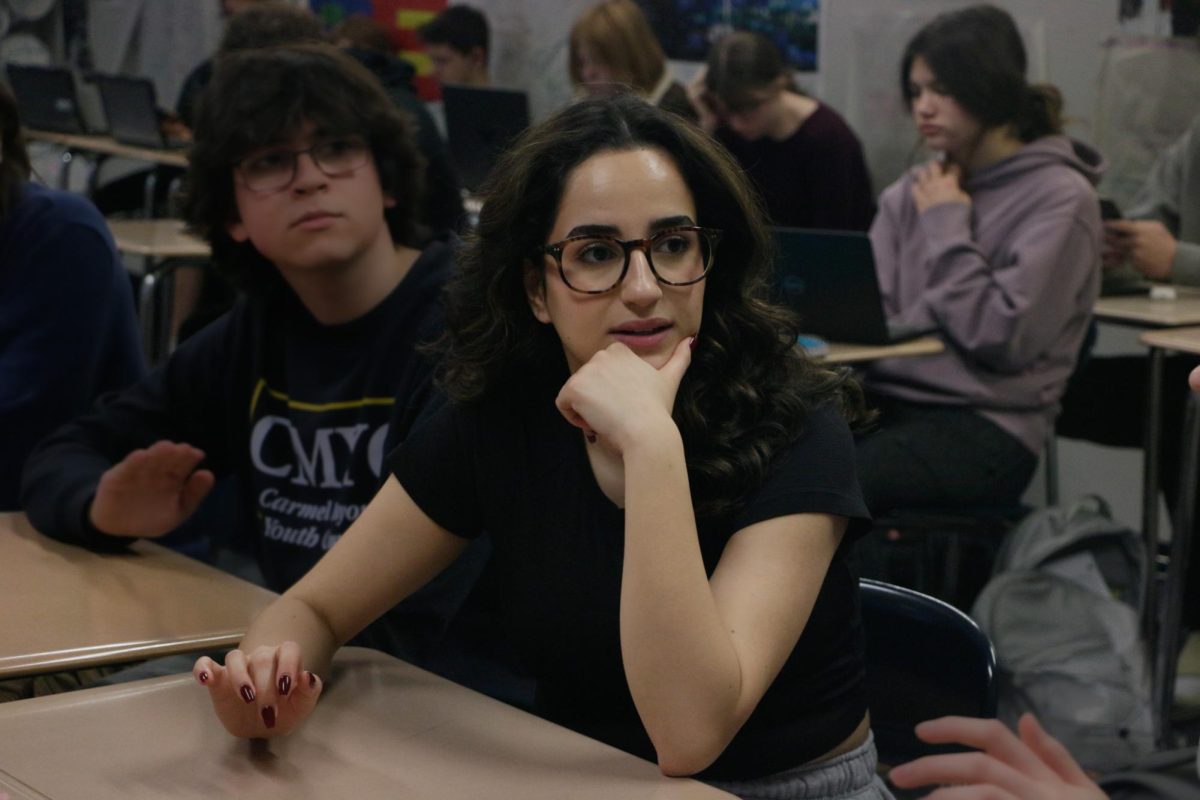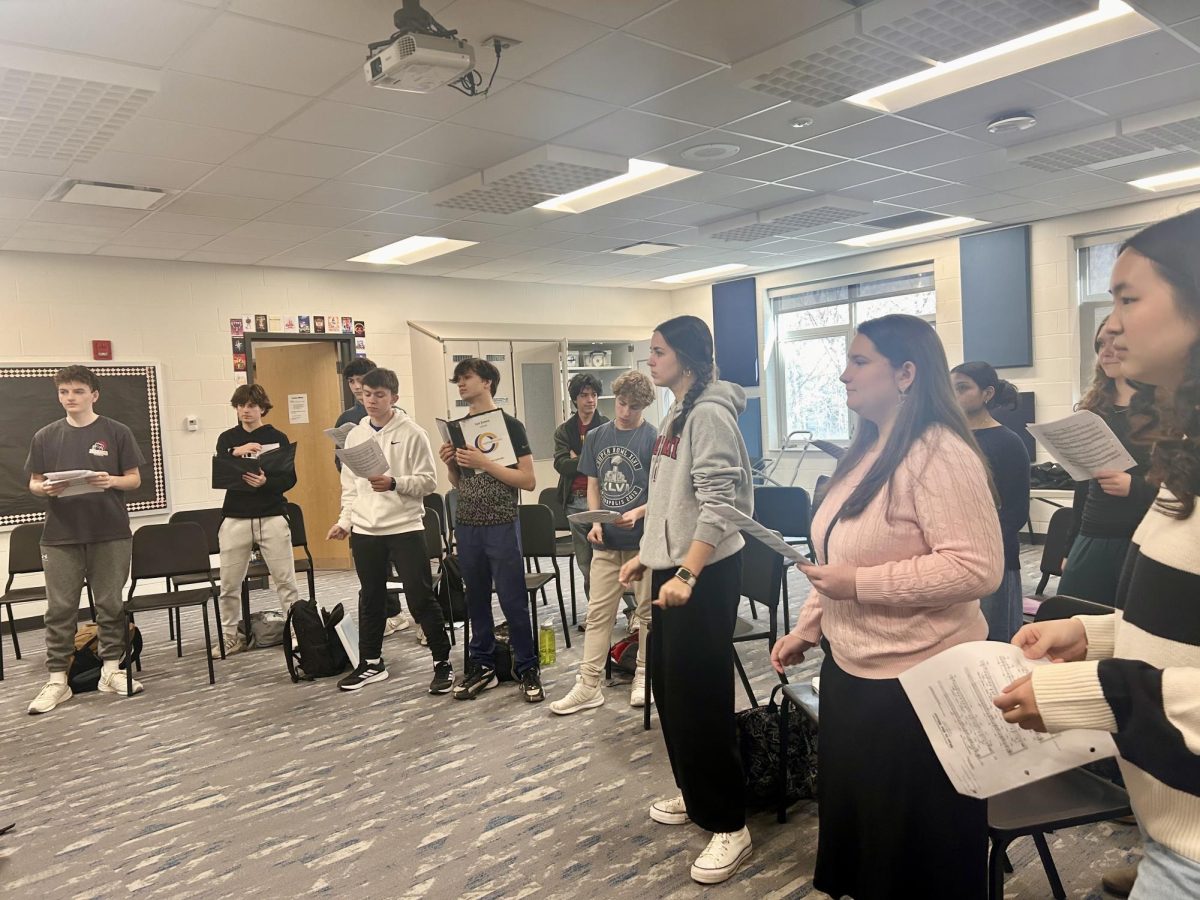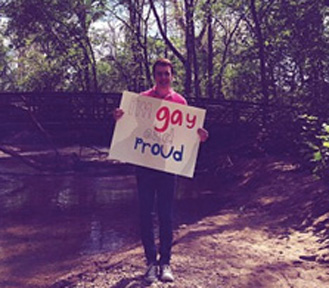
Senior Charles Binion took a bold step last May when he came out as gay through a popular social media network. “I came out via Instagram,” Binion said. “I wrote, ‘I’m gay and proud’ on a poster; then I went to Eagle Creek Park, stood near a river, and my friend Taylor took a picture of me. I made it all artsy and everything, so it’s still my flow. I put it on Instagram, and within 10 minutes I had over 300 likes. I started crying because I was so excited seeing all the comments of people saying ‘I love you’ and ‘You’re still an amazing person.’”
Binion said he felt accepted by the vast majority of people at this school. However, he encountered the most disapproval around his religious classmates.
After receiving a negative comment on an Instagram post about marriage equality, Binion took action.
“I texted the individual asking why he would comment (something negative). He said he came from a religious background,” Binion said. “He called me on the phone and kept going on and on telling me that my opinion was wrong and that I shouldn’t live the lifestyle I wanted to, being gay. He told me that he didn’t believe in what I was doing.”
National v. Local Acceptance
In a changing society, it is not surprising that acceptance of homosexuals is controversial at CHS. Coming out and facing the struggles of acceptance within religion or taking a stance on gay marriage can be controversial, and the beliefs of homosexuals may not be standard among the student body. According to a 2013 survey by Pew Research Center, 92 percent of America’s lesbian, gay, bisexual and transgender (LGBT) adults say societal acceptance of their lifestyle in the past decade has grown greatly. Popular reasons for this growth range from knowing and interacting with someone who is LGBT to seeing LGBT adults in media interacting and raising families. However, the views of students and teachers at this school and elsewhere are often influenced by their religious background and beliefs about equality.
Chris Warren, Biblical Literature teacher and Gay-Straight Alliance (GSA) co-sponsor, said religion tends to play a major role in views of homosexuality.
Warren, who is gay, said, “You have a pope (Francis) that about a month or two months ago was asked about a monsignor who was reportedly in a gay relationship. And the pope’s response was, ‘Who am I to judge?’ And that’s the head of the Catholic Church. I think that people can use their religion to discriminate against anything and anybody. It’s not religion that’s the problem, it’s the way that people interpret it. Religion is a beautiful, wonderful thing that gives hope to billions of people on this planet. I don’t think it’s fair to say that religion causes people to discriminate against gay people or anyone for that matter. I think that people use it, but it doesn’t mean that there’s a causal relationship there.”

teacher and Gay-Straight Alliance (GSA) co-sponsor, talks to a student during class. Warren said he is no longer hesitant about telling students about his sexuality because this school’s administration has been supportive on the issue.
Scott McDermid, the youth pastor at the Carmel United Methodist Church, said he believes society is becoming more accepting about gays in religion even though there are still some pockets of discrimination against homosexuals.
“The reason that people think religion affects views of homosexuals is because the bible is pretty clear-cut when it comes to homosexuality,” McDermid said. “The Bible defines it as sinful behavior. Sin separates us from God, so the church has traditionally viewed homosexuality as something that separates us from God. I absolutely believe that most churches have become more accepting of homosexuals as a part of their congregation and in the community, as they should be. Because we are all sinners, the Bible makes that very clear. So who are we to judge people that sin differently than we do? Homosexuality, we believe, is a sin, but it is not more sinful than any other sin. Not worse than the sin of pride, lust or greed, which the Bible also speaks out against.”
School District Support
Warren said he used to be hesitant to tell students his sexuality for fear of reactions from both CHS and the school district. As a result, he met with a few teachers, former Superintendent Jeff Swenson and Principal John Williams to discuss a policy on how to approach the subject.
“I said ‘I’m a gay teacher. I don’t feel embarrassment or shame or that I’m doing anything wrong or inappropriate, so how should I address that as a teacher to student who inquires about my personal life?’” Warren said. “Other teachers have the freedom to talk about their wives and kids, and I’m not sure how the administration would want me to respond. They were extremely supportive and said, ‘Don’t lie to kids. You’re here because you’re a good teacher, not because of your personal life. Feel free to share anything that you feel is appropriate.’ (Sherri) Pankratz, (English Teacher and) the CCEA President at the time, and I, and last February they passed a non-discrimination policy that includes sexual orientation.
 Some students have argued that it is unnecessary for teachers to tell students about their personal life, but Warren said he feels not telling students might do them more harm in some circumstances.
Some students have argued that it is unnecessary for teachers to tell students about their personal life, but Warren said he feels not telling students might do them more harm in some circumstances.
“The biggest wake-up call for me was reading about students who felt very alone in their struggle to deal with being different, so much so that they engaged in destructive behavior, depression and sometimes suicide,” Warren said. “I realized that I have a responsibility to be a positive role model and show kids that it truly does get better. That’s why I felt the need to start the conversation with Dr. Swenson and Principal Williams. In those conversations, both were fantastic, supportive and interested. They were invited and came to a presentation by the GSA students talking about the importance of gay issues in the Carmel school district. They were nothing but supportive.”
Places for Discussion
GSA is a club that has been at Carmel for over a decade, striving to give both gay and straight students the opportunity to stick up for their rights and bring light to some of the issues here within the student body.
Counselor and former GSA sponsor Bettina Cool said, “What is important about GSA is it’s not just a club for kids that are gay or lesbians. It’s for kids that are gay and kids that are straight who support equal rights. I think it’s a worthwhile club for kids who need support and a voice.”
Binion agreed that clubs like GSA are important to the future of Carmel.
“I’m happy our school is so accepting to allow clubs that may be controversial to still go on at Carmel,” he said. “I think an issue that our school, as well as the rest of society, struggles with is the use of the word ‘gay’ in a negative way. I know personally, it offends me when people use it in a rude way, and I’ve talked to many of my gay friends, and they hate it too. I hope that our school tries to make a difference by not using the word ‘gay.’”
Many students do not realize the environment they create when
they use derogatory words or use the word “gay” in a derogatory way, Warren said.
“(Gay is) one of those words that has come to mean stupid, or silly, or something light-hearted as a negative,” Warren said. “But if you are gay you take it very personally. So I’d like to see students try to refrain from using that, but I’ve had several gay students in class and I’ve never witnessed any discrimination against them. But, it’d be a pretty bold statement. Who would make fun of a gay kid in front of me?”































![AI in films like "The Brutalist" is convenient, but shouldn’t take priority [opinion]](https://hilite.org/wp-content/uploads/2025/02/catherine-cover-1200x471.jpg)













































![Review: “The Immortal Soul Salvage Yard:” A criminally underrated poetry collection [MUSE]](https://hilite.org/wp-content/uploads/2025/03/71cju6TvqmL._AC_UF10001000_QL80_.jpg)
![Review: "Dog Man" is Unapologetically Chaotic [MUSE]](https://hilite.org/wp-content/uploads/2025/03/dogman-1200x700.jpg)
![Review: "Ne Zha 2": The WeChat family reunion I didn’t know I needed [MUSE]](https://hilite.org/wp-content/uploads/2025/03/unnamed-4.png)
![Review in Print: Maripaz Villar brings a delightfully unique style to the world of WEBTOON [MUSE]](https://hilite.org/wp-content/uploads/2023/12/maripazcover-1200x960.jpg)
![Review: “The Sword of Kaigen” is a masterpiece [MUSE]](https://hilite.org/wp-content/uploads/2023/11/Screenshot-2023-11-26-201051.png)
![Review: Gateron Oil Kings, great linear switches, okay price [MUSE]](https://hilite.org/wp-content/uploads/2023/11/Screenshot-2023-11-26-200553.png)
![Review: “A Haunting in Venice” is a significant improvement from other Agatha Christie adaptations [MUSE]](https://hilite.org/wp-content/uploads/2023/11/e7ee2938a6d422669771bce6d8088521.jpg)
![Review: A Thanksgiving story from elementary school, still just as interesting [MUSE]](https://hilite.org/wp-content/uploads/2023/11/Screenshot-2023-11-26-195514-987x1200.png)
![Review: "When I Fly Towards You", cute, uplifting youth drama [MUSE]](https://hilite.org/wp-content/uploads/2023/09/When-I-Fly-Towards-You-Chinese-drama.png)
![Postcards from Muse: Hawaii Travel Diary [MUSE]](https://hilite.org/wp-content/uploads/2023/09/My-project-1-1200x1200.jpg)
![Review: "Ladybug & Cat Noir: The Movie," departure from original show [MUSE]](https://hilite.org/wp-content/uploads/2023/09/Ladybug__Cat_Noir_-_The_Movie_poster.jpg)
![Review in Print: "Hidden Love" is the cute, uplifting drama everyone needs [MUSE]](https://hilite.org/wp-content/uploads/2023/09/hiddenlovecover-e1693597208225-1030x1200.png)
![Review in Print: "Heartstopper" is the heartwarming queer romance we all need [MUSE]](https://hilite.org/wp-content/uploads/2023/08/museheartstoppercover-1200x654.png)



